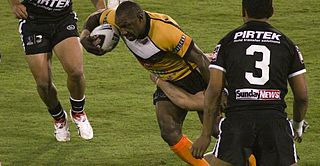The People's Republic of China possesses a diversified communications system that links all parts of the country by Internet, telephone, telegraph, radio, and television. The country is served by an extensive system of automatic telephone exchanges connected by modern networks of fiber-optic cable, coaxial cable, microwave radio relay, and a domestic satellite system; cellular telephone service is widely available, expanding rapidly, and includes roaming service to foreign countries. Fiber to the x infrastructure has been expanded rapidly in recent years.
This article is about Communications in Papua New Guinea including newspapers, radio, television, and the Internet.
Satellite Internet access is Internet access provided through communications satellites. Modern consumer grade satellite Internet service is typically provided to individual users through geostationary satellites that can offer relatively high data speeds, with newer satellites using Ku band to achieve downstream data speeds up to 506 Mbit/s.

Goroka is the capital of the Eastern Highlands Province of Papua New Guinea. It is a town of approximately 19,000 people (2000), 1600m above sea level. It has an airport and is on the "Highlands Highway", about 285 km from Lae in Morobe province and 90 km from the nearby town of Kainantu also in the Eastern Highlands. Other nearby towns include Kundiawa in Simbu Province and Mount Hagen in Western Highlands Province. It has a mild climate, known as a "perpetual Spring".

Eastern Highlands is a highlands province of Papua New Guinea. The provincial capital is Goroka. The province covers an area of 11,157 km², and has a population of 579,825. The province shares a common administrative boundary with Madang Province to the north, Morobe Province to the east, Gulf Province to the south, and Simbu Province to the west. The province is the home of the Asaro mud mask that is displayed at shows and festivals within the province and in the country. It is reachable by air and road transport.

Education in Papua New Guinea is managed through nineteen provinces and two district organisational units. It is tuition-free and attendance is not compulsory. With a literacy rate of 64.2%, Papua New Guinea has the lowest literacy rate in Oceania.

EMTV is a commercial television station in Papua New Guinea. Until the launch of the National Television Service in September 2008, it was the country's only free to air television service.
Religion in Papua New Guinea is predominantly Christian, with traditional animism and ancestor worship often occurring less openly as another layer underneath or more openly side by side Christianity. The courts and government in both theory and practice uphold a constitutional right to freedom of speech, thought, and belief. A large majority of Papua New Guineans identify themselves as members of a Christian church ; however, many combine their Christian faith with traditional indigenous beliefs and practices. Other religions represented in the country include the Bahá'í faith, Hinduism and Islam.

The Papua New Guinea Institute of Medical Research is the principal institution conducting health research in Papua New Guinea with a focus on health problems affecting the country's population.

The Papua New Guinea national Australian rules football team represents Papua New Guinea in the team sport of Australian rules football.
The Catholic Church in Papua New Guinea is part of the worldwide Catholic Church, under the spiritual leadership of the Pope in Rome. Papua New Guinea has approximately two million Catholic adherents, approximately 27% of the country's total population.

Stanley Gene is a Papua New Guinean former rugby league Kumul (#166) player who has previously coached Gateshead Thunder. He has also coached the academy team at Hull Kingston Rovers and served as the Papua New Guinea Kumuls head coach in 2010. Having moved to England following an impressive showing for PNG in the 1995 Rugby League World Cup, Gene enjoyed a long career in the British game with spells at Hull Kingston Rovers, Huddersfield Giants, Bradford Bulls, Hull F.C. and Halifax.
Makali P. Aizue is a professional Papua New Guinean rugby league footballer who plays for Doncaster in Kingstone Press League 1. He plays as a prop.

The Papua New Guinea National Rugby League Competition is a semi-professional rugby league competition held annually in Papua New Guinea. Formerly known as the SP Inter-City Cup or SP Cup (1990–2008) and later the Bemobile Cup (2009–2010) after changes in sponsorship. The current competition is sponsored by pacific telecommunications giant Digicel and is now known as the Digicel Cup.
Sport in Papua New Guinea is an important part of the national culture. Rugby league is the most popular sport in Papua New Guinea.
The Papua New Guinea Country Party is a political party in Papua New Guinea.

SES Broadband is a two-way satellite broadband Internet service available across Europe, which launched in March 2007, and uses the Astra series of geostationary satellites.
Seigfried Gande is a Papua New Guinean rugby league international. His position is second row.
The National Union of Students is the peak representative body for tertiary students in Papua New Guinea. It has involved representatives, among others, from the University of Papua New Guinea, the University of Goroka, the Papua New Guinea University of Technology, Divine Word University, the Papua New Guinea University of Natural Resources and Environment, Lae Technical College, Balob Teachers College and the Holy Trinity Teachers College.
Joe Lera is a Papua New Guinean politician. He has been a United Resources Party member of the National Parliament of Papua New Guinea since 2012, representing the Bougainville Regional seat. Although regional members generally assume the position of Governor, due to the existence of the devolved Autonomous Bougainville Government Lera is referred to as the "Regional Member for Bougainville". He has been the Minister for Bougainville Affairs in the government of Peter O'Neill since April 2016.











